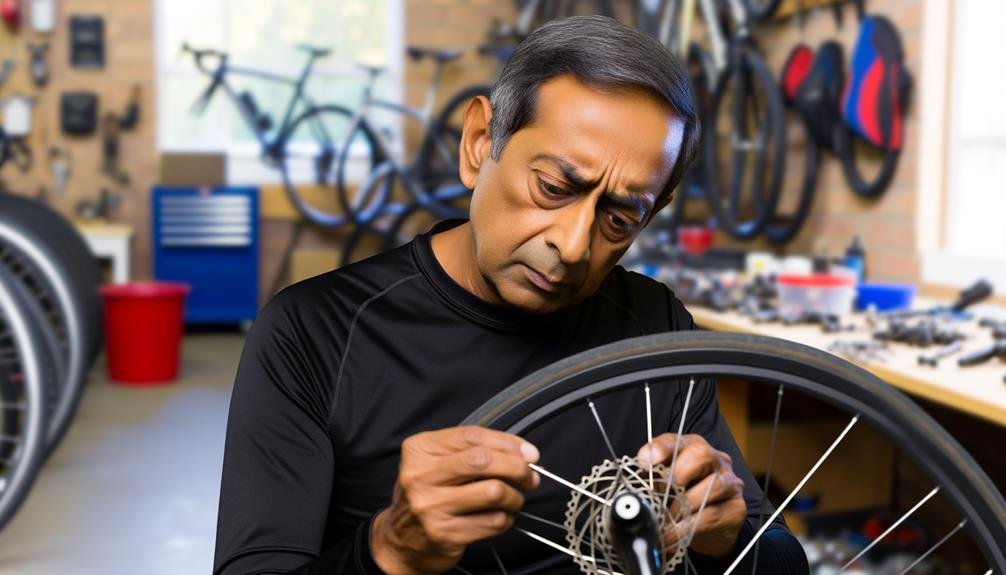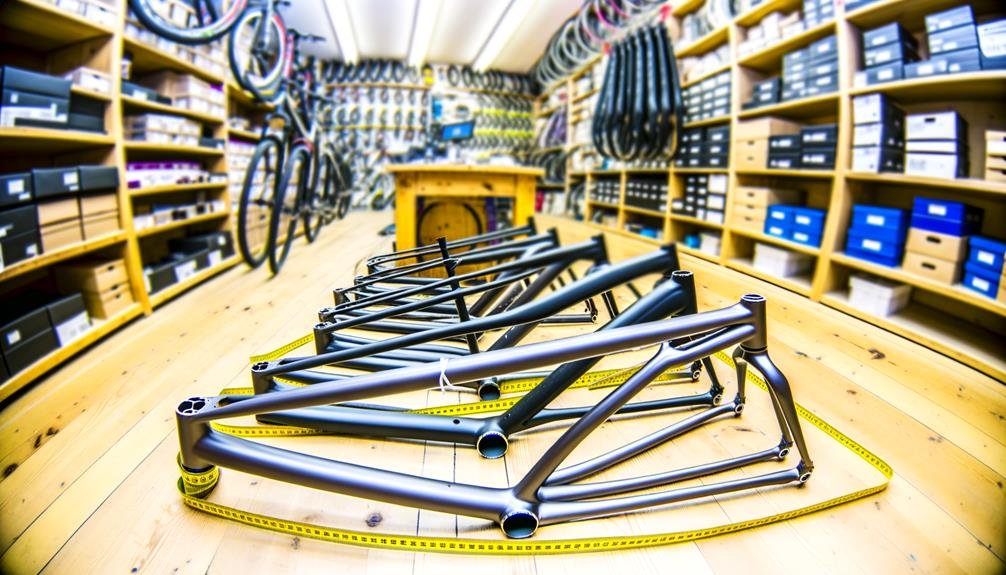Charles Miller is a veteran bike enthusiast with over 12 years of experience dealing with bikes as a mechanic. Despite immense love and expertise for...
Just as a single damaged thread can compromise the strength of a woven tapestry, a single broken spoke can significantly impact the overall performance of a bicycle.
We've all been there, cruising down a path and hearing that tell-tale snap that signals a broken spoke. But can you carry on riding with a broken spoke?
Well, we're here to unravel this mystery. It's not as straightforward as you might think and the answer might just surprise you.
So, why not stick around and get the full picture?
Key Takeaways
- Broken spokes can affect the stability and control of a bike, causing the wheel to wobble and potentially leading to further damage.
- It is safe to ride with one or two broken spokes, but they should be promptly removed to maintain bike performance and safety.
- Ignoring broken spokes can result in more spokes breaking, increasing stress on the remaining ones and compromising the wheel's alignment.
- Regular maintenance, including inspecting and adjusting spoke tension, can prevent frequent spoke breakage and ensure a smooth and safe ride.
Understanding Bicycle Spokes
To fully grasp the impact of a broken spoke, we first need to delve into understanding bicycle spokes, their role, and how they function in the overall mechanics of a bike. Essentially, spokes are thin rods or bars connecting the bike's hub to the rim. They're not just there for aesthetic appeal; they play an integral part in the bike's stability, weight distribution, and overall performance.
When we ride, the bike spoke absorbs much of the force exerted, ensuring the wheel remains true and round. It's a delicate balance, a symphony of tension and release that keeps us moving smoothly and efficiently. However, this balance can be disrupted when spokes break.
A broken or damaged spoke isn't just an inconvenience; it can compromise the structural integrity of the wheel, potentially leading to more dangerous situations.
We're all in this journey together, and understanding the fundamental role of these seemingly small components can help us better appreciate the complex and beautiful machine that's our bicycle.
Identifying Broken Spokes
Now, let's talk about how to identify broken spokes.
It begins with being alert to unusual noises and a misaligned wheel, which are telltale signs of spoke damage.
Understanding these symptoms can significantly impact your bike's performance, so let's discuss each in detail.
Signs of Broken Spokes
Identifying broken spokes on your bike is crucial, and they often reveal themselves through a unique sound while riding or by causing the wheel to wobble. These are the primary signs of broken spokes. The sound is typically a telltale clicking or popping noise. The wobble might seem like a minor inconvenience, but it's actually a glaring red flag: you're riding a Bike With a Broken spoke.
Ignoring this could lead to loss of control, and further damage to your bike. We strongly recommend removing the broken spoke as soon as possible to avoid these issues.
We're all part of the biking community, and it's our duty to ensure our rides are safe and sound. Your bike's health reflects on us all.
Diagnosing Spoke Damage
Having considered the signs of a broken spoke, let's shift our focus to accurately diagnosing spoke damage, a key step in maintaining your bike's performance and safety. We'll use a simple table to guide us through the process.
| Step | Action | Outcome |
|---|---|---|
| 1 | Visually inspect your bike wheel | Spot any obvious broken spoke |
| 2 | Spin the wheel gently | Observe any wobbling that indicates a broken spoke |
| 3 | Tap each spoke lightly | Listen for any unusual sounds that suggest damage |
Impact on Bike Performance
In the realm of cycling, broken spokes can greatly impact the performance of our bike, making it crucial to identify and address them promptly.
A ride a bike with a broken spoke can become a challenge as it tends to make the wheel wobble, affecting our control.
It can be safe to ride with one or two broken spokes, but we must ensure they're removed to prevent further damage.
If left unattended, more spokes might break, escalating the situation from a simple repair to a costly one.
Let's remember, the removal of a broken spoke not only enhances bike performance, but it also safeguards the rest of the wheel enabling continued cycling.
Dangers of Riding With Broken Spokes
When you're on a bike with a broken spoke, the rim can start to pull in one direction, causing wheel misalignment and potentially damaging the wheel, tire, and brakes. This is one of the dangers of riding with broken spokes. It's not just about how it affects performance but also about the safety risks posed.
A broken spoke increases stress on the remaining spokes. This heightened strain could lead to further breakage, compromising the bike's stability and efficiency. It's like a domino effect; one broken spoke can trigger more, thereby increasing the danger exponentially.
If you continue to ride a bike with a broken spoke, severe wheel misalignment could occur. This results in an unstable wheel, extra weight, and potential damage to the brakes and frame. Multiple broken spokes can even compromise the wheel's direction, posing a significant risk to the rider.
We can't stress this enough – it's crucial to seek professional advice when dealing with wheel misalignment due to broken spokes. This precaution can prevent further damage and ensure your safety. Remember, your wellbeing is more important than a quick ride.
Reasons for Frequent Spoke Breakage

We're about to explore why spokes break so often. It could be due to causes like rim damage, excess weight, or even manufacturing defects.
Let's also consider the role of cycling terrain and the potential mistakes we make during spoke maintenance.
Causes of Spoke Breakage
Spoke breakage on a bike can occur for various reasons, including a damaged rim, excess weight, manufacturing defects, or simple wear and tear. It's crucial to understand the causes of spoke breakage so we can prevent it.
Let's look at some of the most common causes of spoke breaks:
| Cause | Prevention |
|---|---|
| Damaged Rim | Regularly inspect and repair any visible damage |
| Excess Weight | Avoid carrying heavy loads beyond the bike's capacity |
| Manufacturing Defects | Choose high-quality bikes from reputable manufacturers |
| Wear and Tear | Regular maintenance and cleaning of bike parts |
Spoke Maintenance Mistakes
Understanding the causes of spoke breakage is essential. This includes factors such as damaged rims or excess weight. However, it is equally important to recognize the mistakes we often make in spoke maintenance that can lead to frequent breakage.
One common mistake is ignoring broken spokes. Riding with a broken spoke increases stress on the remaining spokes, causing more breakages. It is important to always replace broken spokes promptly.
Another mistake is incorrect tension. Spokes need the right tension. Over-tightening can cause them to snap, while loose ones can lead to wheel misalignment.
Neglecting regular maintenance is also a mistake. Keeping spokes clean, free from rust, and properly tensioned prevents breakage. Regular maintenance is crucial for preventing spoke breakage.
Impact of Cycling Terrain
Navigating through rough terrain, such as off-road trails or poorly maintained roads, often puts a significant amount of stress on bike spokes, leading to frequent breakages. Particularly in mountain biking, the impact of cycling terrain is intensified, causing excessive strain on our road bike spokes. This can result in misalignment of the wheel, affecting stability and potentially leading to further damage.
We must remember, spokes maintain the structural integrity and balance of the wheel. Frequent breakage compromises our bike's performance. Regular maintenance, including inspecting and adjusting spoke tension, can help prevent these issues.
We're all in this biking community together, so let's stay knowledgeable and proactive in caring for our bikes, especially when riding on challenging terrain.
Expert Opinions on Broken Spokes

In the realm of cycling, experts generally agree that while riding with a broken spoke is safe for short distances, it's crucial to remove the damaged spoke promptly to avoid causing further harm to your bike. This is a common consensus among expert opinions on broken spokes.
Let's delve into the reasons why:
- A broken spoke can cause undue stress on the remaining spokes, disrupt the wheel's balance, and potentially lead to more breakage.
- Multiple broken spokes or severe wheel misalignment are clear signs to stop riding immediately. This is to prevent further damage to the wheel, tire, and brakes.
- Regular maintenance and care of your bike's spokes can prevent future breakage, ensuring a smooth and safe ride.
Remember, although it's generally safe to ride with a broken spoke on smooth terrain, the damaged spoke must be removed promptly. Don't risk further damage to your bike.
Our shared love for cycling binds us, and as part of this community, we all have a responsibility towards our bikes. A well-maintained bike ensures a secure ride, and a secure ride always brings joy.
How to Repair Broken Spokes
Often, we'll find ourselves needing to repair a broken spoke, and knowing the right steps can save us both time and potential damage to our bike.
The first step to repair broken spokes is to remove the broken spoke. Use a spoke wrench to loosen the nipple on the rim, then gently pull the broken spoke out from the hub.
Now, thread the new spoke through the hub hole and into the corresponding hole in the rim. The pattern should match the surrounding spokes, so take a moment to ensure you've got it right. Tighten the nipple with your fingers, then use the spoke wrench again to secure it.
Here's an important tip: don't overtighten. We want to maintain an even tension across all spokes to prevent further damage.
Once done, spin the wheel to check for any wobble. If it runs true, you've successfully completed the repair.
Maintaining Your Bike's Wheel Health

While it's crucial to fix broken spokes promptly, it's equally important to regularly monitor and maintain your bike's wheel health to prevent such issues in the first place. As part of our biking community, we all share the responsibility of caring for our treasured cycles.
Let's delve into three simple, yet significant, steps to ensure your bike's wheel remains in good shape:
- Regular Inspection: Always keep a keen eye on your wheels. Check for any signs of wear, wobble, or damage, including broken spokes. Early detection is key to preventing more extensive harm.
- Proper Inflation: Maintaining the correct tire pressure not only ensures a smoother ride but also reduces the risk of rim and spoke damage.
- Routine Cleaning: Dirt and debris can lead to undue wear on your bike's wheels. Regular, gentle cleaning helps keep them in optimal condition.
Frequently Asked Questions
How Long Can I Ride a Bike With a Broken Spoke?
We wouldn't recommend riding long with a broken spoke. It'll impact your wheel's balance, causing wobbling issues. The strain from a broken spoke can cause further damage. It's safer to fix it promptly.
What to Do if a Bike Spoke Breaks?
We'd advise not to panic if a bike spoke breaks. We're here with helpful spoke maintenance tips, broken spoke indicators, and spoke replacement methods to get your bike back to top shape.
How Much Does It Cost to Fix a Broken Spoke on a Bike?
We've found that the spoke replacement process typically costs between $20 and $30. However, with some DIY spoke repair and regular spoke maintenance tips, we can save a bit of cash in the long run.
Is It Safe to Ride With a Loose Spoke?
We'd advise against riding with a loose spoke. It's not just about immediate spoke dangers, but also long-term wheel health. Regular spoke maintenance can prevent such issues. If necessary, consider spoke alternatives for a safer ride.
Conclusion
So, there we've it. While technically you can pedal away with a broken spoke, it's hardly the wisest choice. Oh, the irony! A tiny, seemingly insignificant spoke can cause such a ripple effect on your ride. But, that's just how it works.
Remember, maintaining wheel health isn't just about smooth rides, it's about safe ones too. So, let's play it smart, folks, and give those spokes the attention they deserve!

Charles Miller is a veteran bike enthusiast with over 12 years of experience dealing with bikes as a mechanic. Despite immense love and expertise for his Tacoma, he rides his Trek Ebike more. Anytime you meet him, you’ll either hear him talking about Bikes, or writing about all things bikes and cars on this blog.
More Posts


